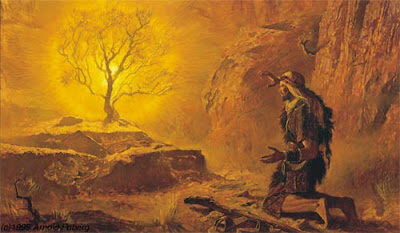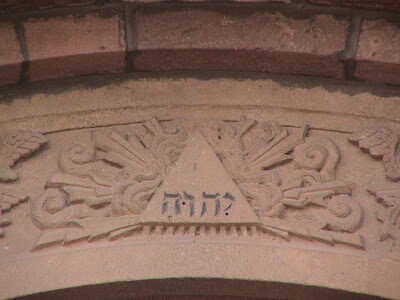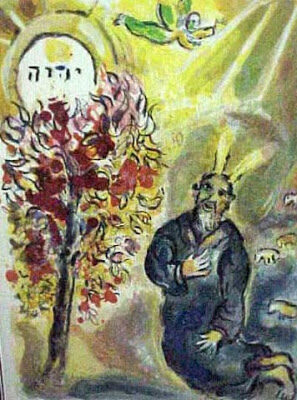What would you do if you saw a burning bush? A bush that had every appearance of being on fire and yet, was not being consumed by it?
Would you instantly say, “Lord God Almighty!!!!!!!!!”
Would you say, “What a fascinating coincidence! The natural laws are interacting in a rather unexpected manner. Perhaps, someday we will find a materialist answer. S’mores anyone?”
Well, if you were like Moses you would do neither. Yet, in a way, he a bit of both (short of the s’mores).
In Exodus 3:2-3 we find Moses at Horeb and we learn that “Moses saw that though the bush was on fire it did not burn up. So Moses thought, ‘I will go over and see this strange sight-why the bush does not burn up.’”
Moses’ first reaction is to think critically, skeptically and scientifically: he thought about what he was seeing, he planed a course of action, he approached the phenomenon and he determined to examine it.
Then, “When the LORD saw that he had gone over to look, God called to him from within the bush, ‘Moses! Moses!_I am the God of your father, the God of Abraham, the God of Isaac and the God of Jacob.’ At this, Moses hid his face, because he was afraid to look at God” (Exodus 3:4, 6). The reference to looking at God is in reference to v. 2 which stated, “There the angel of the LORD appeared to him in flames of fire from within a bush.” Angel of the LORD being a term synonymous for God Himself. It is likely a reference to a Christophany, a pre-incarnate appearance of Christ. But this is theological minutia which goes beyond the scope of this essay.
Now, what would you do if God told you, very clearly, to go and do something?
Would you instantly say, “Yes, of course, here I go!”
Would you say, “Wow maaaaaan, I’m like sooooo hallucinating!”
Well, if you were like Moses you would do neither.
“‘I am sending you to Pharaoh to bring my people the Israelites out of Egypt.’ But Moses said to God, ‘Who am I, that I should go to Pharaoh and bring the Israelites out of Egypt?’ And God said, ‘I will be with you. And this will be the sign to you that it is I who have sent you: When you have brought the people out of Egypt, you will worship God on this mountain’” (Exodus 3:10-12).
Moses does not march off in lockstep but questions why he is chosen and for the task at hand. God recognizes that Moses, a sheep herding nobody, will need some evidence that it is God who is talking to him, sending him to confront Pharaoh who at the time was one of the, if not the, earth’s most powerful ruler. God states that Moses will succeed in bringing the Israelites out of Egypt and that they will enjoy the freedom of worshipping God at Horeb.
Thus, Moses will engage upon a scientific experiment, as it were. He engages upon an act knowing that he will either be unsuccessful or successful.
That he would be unsuccessful is most likely since Moses was one single man, who was a nobody, with no authority, and no army (and not even the support of the Jews, at that time). This would be evidence that God did not send him but that he just ate a bad falafel the night before which caused him to hallucinate.
That he would be successful would quite literally a one man against the world scenario. This would serve as confirmation that he had an encounter with God.
Next comes an exchange from which there is much to infer:
“Moses said to God, ‘Suppose I go to the Israelites and say to them, ‘The God of your fathers has sent me to you,’ and they ask me, ‘What is his name?’ Then what shall I tell them?’ God said to Moses, ‘I am who I am. This is what you are to say to the Israelites: ‘I AM has sent me to you’” (Exodus 3:13-14).
God declares that He is the I AM, “I am who I am,” or “I will be what I will be.” This is understood to mean the self-existent one, the one who is, the one who is not moved by any greater external force. God is known as the one who is, was and is to come, the beginning and the end, the Alpha and Omega.
Consider that time, space and matter came into being at a particular point, at the very beginning of time, space and matter. The Bible’s very first verse states, “In the beginning, God created the heavens and the earth.”Look at it this way: “In the beginning [time], God created the heavens [space] and the earth [matter].”
Moreover, consider it this way: “In the beginning [time], God [a preexistent being] created [infused with energy, omnipotentlly designed] the heavens [space] and the earth [matter].”
Furthermore, it is reasonable to draw the following inferences:Since time came into being at a particular point-whatever existed “before” then was timeless, or eternal.Since space came into being at a particular point-whatever existed “before” then was infinite, or not restricted to locality.
Since matter came into being at a particular point-whatever existed “before” then was immaterial, or spirit and not affected by any natural laws.
Moses’ skeptical and scientific inquisitive nature would come into play time and time again as is exampled in life his story as found in the Bible.
~~~~~~~~~~~~~~~~~~~~~~~~
A plea: I have to pay for server usage and have made all content on this website free and always will. I support my family on one income and do research, writing, videos, etc. as a hobby. If you can even spare $1.00 as a donation, please do so: it may not seem like much but if each person reading this would do so, even every now and then, it would add up and really, really help. Here is my donate/paypal page.
Due to robo-spaming, I had to close the comment sections. However, you can comment on my Facebook page and/or on my Google+ page. You can also use the “Share / Save” button below this post.



